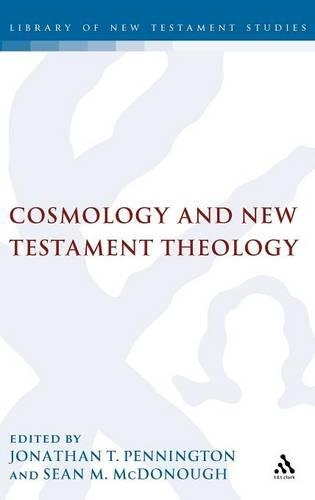
Cosmology and New Testament Theology
(Hardback)
Publishing Details
Cosmology and New Testament Theology
By (Author) Dr Jonathan T. Pennington
Edited by Dr Sean M. McDonough
Bloomsbury Publishing PLC
T.& T.Clark Ltd
22nd May 2008
United Kingdom
Classifications
Tertiary Education
Non Fiction
Theology
Criticism and exegesis of sacred texts
231.765
Physical Properties
Hardback
224
Width 156mm, Height 234mm
494g
Description
For first-century people, cosmology was a fundamental part of their worldview. Whether it was the philosopher contemplating the perfection of the heavenly orbits, the farmer searching the sky for signs of when to plant his crops, or the desert-dwelling sectarian looking for the end of the world, the cosmos held an endless fascination and occupied a prominent place in their understanding of life. For most ancient peoples, cosmology and theology were inseparable. Thus, when the Jewish and Christian Scriptural traditions begin with the bold claim, "In the beginning God created the heavens and earth," these words make statements which are at once cosmogonic, cosmological, and theological. Scholarship has begun only recently to investigate more fully the various cosmological and cosmogonic traditions that were current in the time of the Old and New Testaments. Much of this work, however, has focused on how OT conceptions of the world compared to other Ancient Near Eastern traditions. Much less has been done on the cosmological traditions which stand behind the views of the NT writers. Even fewer works have sought to connect cosmological views with NT theology. In light of the great importance that cosmology had in ancient peoples' worldviews and theological understanding, a thorough investigation of this neglected topic is in order. Cosmology and New Testament Theology systematically examines the NT documents to show how cosmological language and concepts inform, interact with, and contribute to the specific theological emphases of the various NT books. In some NT books, the importance of cosmology can be easily discerned, while in others what is required is a new and close examination of key cosmological terms (e.g., heaven, earth, world, creation) with an eye to the themes and theology of the book.
Reviews
Review in International Review of Biblical Studies, vol. 54:2007/08
This edited book is a welcomed addition to the study of New Testament cosmology and is expected to serve both scholars and pastors as a helpful overview of the topic. -- ane Ryul Lee * Expository Times, September 2009 *
This is not merely a collection of analyses of such things as just how many levels of heaven Paul may have thought there were (although such issues are not overlooked) but rather a refreshingly wide-ranging collection of essays that consistently and seriously engages with theological significance of the cosmological language used by the NT authors... I warmly recommend this book to anyone interested in the cosmology or the theology of the NT, and readers will discover in the end that neither of these subjects can in fact be treated in isolation from the other. -- Jonathan Moo * Journal of the Evangelical Theological Society, 2010 *
... detailed validation makes the volume a valuable resource for reference libraries. -- Casimir Bernas * Religious Studies Review, Vol. 35 No. 1, March 2009. *
Author Bio
Jonathan T. Pennington is Assistant Professor of New Testament Interpretation, Southern Seminary, Louisville, KY. He is the author of several Greek and Hebrew reference works with Zondervan and Cambridge University Press, as well as articles on LXX studies, OT cosmology, and Greek grammar. Dr. Sean M. McDonough is Associate Professor of New Testament at Gordon-Conwell Theological Seminary in South Hamilton, Massachusetts, USA.
